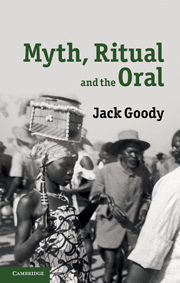Book contents
- Frontmatter
- Contents
- Acknowledgements
- Introduction
- 1 Religion and ritual from Tylor to Parsons: the definitional problem
- 2 Oral ‘literature’
- 3 The anthropologist and the audio recorder
- 4 Oral creativity
- 5 The folktale and cultural history
- 6 Animals, humans and gods in northern Ghana
- 7 The Bagre in all its variety
- 8 From oral to written: an anthropological breakthrough in storytelling
- 9 Writing and oral memory: the importance of the ‘lecto-oral’
- Appendix Folktales in northern Ghana
- References
- Index
7 - The Bagre in all its variety
Published online by Cambridge University Press: 05 June 2012
- Frontmatter
- Contents
- Acknowledgements
- Introduction
- 1 Religion and ritual from Tylor to Parsons: the definitional problem
- 2 Oral ‘literature’
- 3 The anthropologist and the audio recorder
- 4 Oral creativity
- 5 The folktale and cultural history
- 6 Animals, humans and gods in northern Ghana
- 7 The Bagre in all its variety
- 8 From oral to written: an anthropological breakthrough in storytelling
- 9 Writing and oral memory: the importance of the ‘lecto-oral’
- Appendix Folktales in northern Ghana
- References
- Index
Summary
The types (genre) of oral literature are many, but they differ in significant ways from written forms. ‘Myth’, for example, is seen as a typical oral form. So it is because we define it that way. But it is much more variable than much current theorizing allows, which has complicating implications for its analysis.
The Bagre is the name of a ‘secret’ association found among the LoDagaa of north-west Ghana and in neighbouring communities. Together with my late friend, Kum Gandah, I have published three volumes containing the transcription and translation of the long work that is recited in the course of the complex initiation recitals in the settlement of Birifu. The first was called The Myth of the Bagre (1972), the second, translated into French as well as English, Une recitation du Bagré (1981). The third contains further transcription and translations, especially from other settlements, the parishes of Gomble and Biro, which are ‘under’ Birifu where the other versions were recorded, but mainly from Lawra situated some ten miles away, which preserves most of the ritual but offers a very different ‘myth’ to accompany it.
To understand the recitation, one needs some knowledge of the association, the accompanying rituals and to some extent the society itself. These I will provide briefly. But I want to begin by saying something about the importance of this recitation for the study of ‘myth’, for the study of standardized oral forms (‘oral literature’), for the elucidation of ‘primitive thought’ and for the comparative study of cognitive processes such as memory.
- Type
- Chapter
- Information
- Myth, Ritual and the Oral , pp. 95 - 116Publisher: Cambridge University PressPrint publication year: 2010



